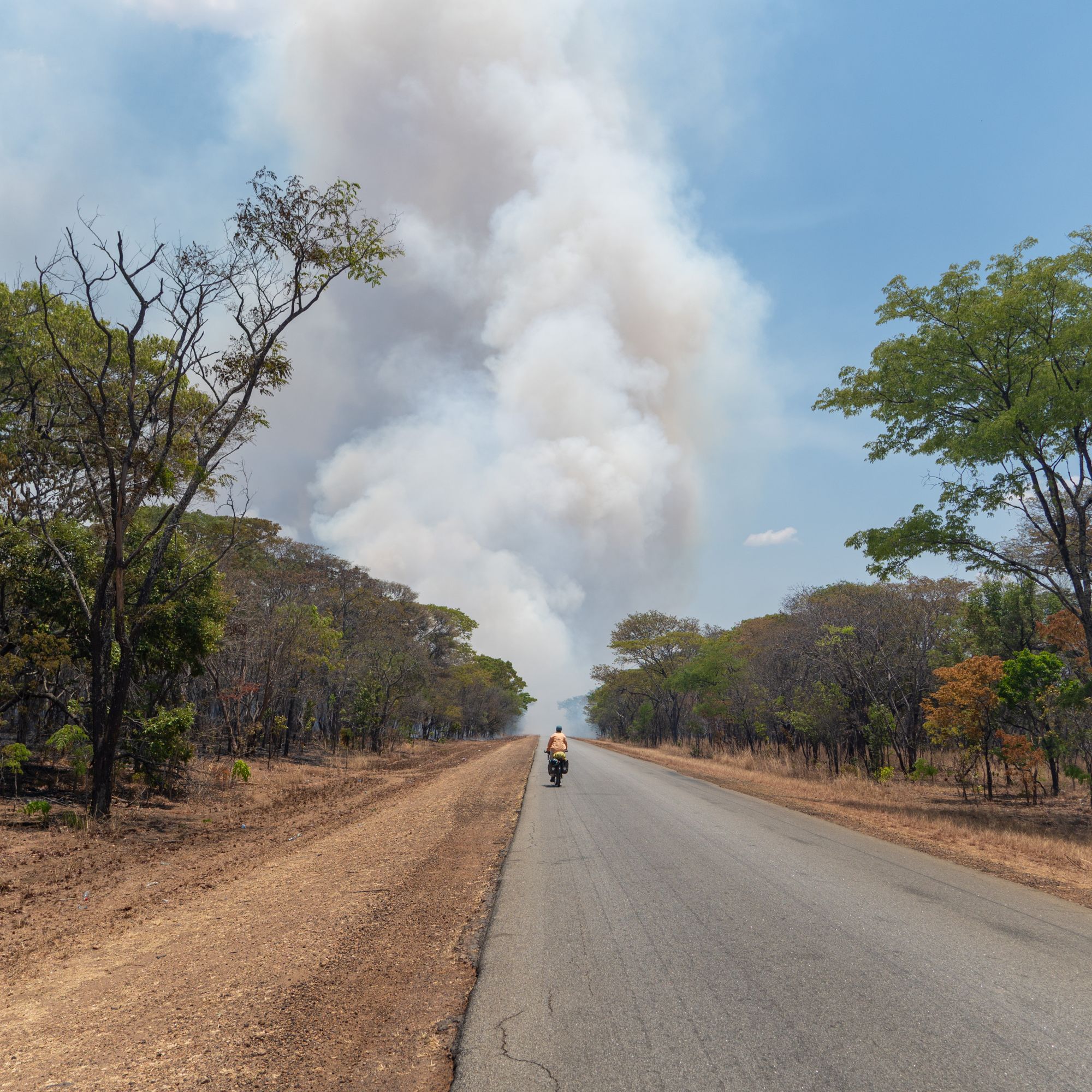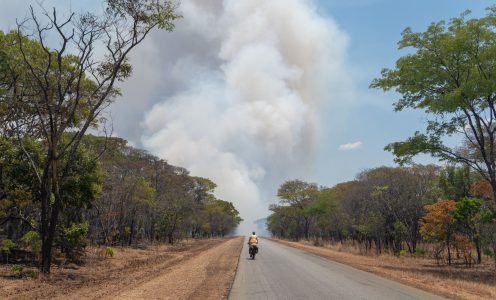We’re off to an exiting start on our excursion to the west of Zambia. It’s 8am and the guys on the streets of Lusaka are already drunk/high and shouting. When a group of them exploit a little traffic jam to get handsy with the bikes, a lot of pushing and shoving ensues. Thankfully they are too spaced out to chase after us as we waddle away on our bikes.
We quickly leave the city behind us. A strong tailwind propels us forwards on the flat, straight road. Where we averaged 60km a day before, we now do 100km and still finish around lunchtime. Nature is preparing for the rainy season. The trees are surprisingly green, in odd contrast to the 40+ degrees daytime temperatures. The cicadas are chirping and birds of prey soar overhead, contemplating whether to carry us off as a snack for the newly hatched chicks.
At the optimistically named Safari Lodge (without any game animals) we get to chatting to the receptionist Beatrice. After agreeing to trade her hair for Lina’s she tells us how she’d love to marry a white guy so that their children can be “coloured” (the Southern African term for a mixed race person). But for some reason all the white guys that come through seem to be married already.
In the evening we are preparing our cycle through Kafue national park by pestering ChatGPT with questions like “What do I do if I encounter a lion by the side of the road?”; “What if it starts stalking me?”. The answers aren’t very encouraging: “Stand your ground and don’t give the impression that you are prey. Do not try and cycle away. This will trigger their chase instinct. Lions run faster than you can pedal.”
Assuredly this is good advice. But we’re very bad actors and we definitely are prey. Fingers crossed that any lions we might encounter will be too sleepy to start hunting for lunch. The next morning we’re on high alert, constantly scanning left and right for swishy tails, both light brown and grey, as elephants are actually a bigger danger than lions. But our only company are the tsetse flies swarming all around.
Towards the end of the cycling day we start seeing some puku antelopes and impalas. At the riverside campsite we catch a glimpse of an elephant, a crocodile and hear much hippo splashing. A group of South African campers share their cold beer with us. In this heat 500ml are sufficient to get us quite drunk. At night we hear some strange noises in the bush. In the morning the campsite attendant confirms that it was a pride of lions.
Philippe from Belgium (but living in Norway) offers to take us for a ride to try and find the lions as they head away from the river. A couple of hours later we haven’t seen any lions and a herd of kudu have long gone while we still sit in the car debating the war in Ukraine and Covid-19. We love a good natured discussion and Philippe invites us to join him in Norway for some salmon fishing.
Back in the saddle we marvel at wattled cranes, vultures and baby warthog as we make our way out of the park again. The tsetse flies have conspired to ruin Lina’s day and she comes away with bad bites all over her body. She breathes an ironic sigh of relief as a massive plume of smoke comes into view. The wild fire on either side of the road is enough to finally rid us of our buzzing plague.
Almost as soon as we exit the cloud of flies we enter a cloud of dust. The road has suddenly deteriorated and we’re faced with over 100km of potholes, roadworks and sandy diversions. Our faces caked in dirt and tempers somewhat impatient we reach a small town in the middle of nowhere. Now that Ben’s shoulder feels a little better, lady providence has decided that it’s time for a bit of a hemorrhoid flare up to keep the drama alive.
After a days rest we move on again. Each morning we have to buy water from a shop since the tap water tastes too pipey even after filtering. Sometimes it stays frozen in the bottles for a while. But at the latest by midday everything is piping hot. Even at night the temperature doesn’t drop below 25 degrees anymore and we begin to wonder how long it will be until we feel cold again.
At a little village we chat with a teacher about the Zambian education system and how the Chinese build things that don’t last and exploit the local workers. In the afternoon we hear a strange sound on the corrugated roof of the guesthouse. We rush outside to feel the last drops of rain before it dries up again.
The next day we complete the final push to Mongu in the far west of Zambia. The town is close to the wetlands around the Zambezi river and mosquitoes greet us enthusiastically upon arrival. Despite that we feel proud to have drawn such a long line on our map – almost 600km from Lusaka. We now prepare to head south again, following the Zambezi to Victoria falls.































I’m, just wanted to point out that Ben isn’t married so I hope you were open to making that woman’s dream come true.
True, but we just couldn’t agree on the price. I wanted at least a baby giraffe. She wasn’t willing to go higher than three guinea fowl.
100km a day by lunchtime is no small feat!
I love the illustrations.
Amazing! Keep pushing!
Great to be following you on your trip after meeting you both at Warthogs in Zimbabwe. I love the illustrations! who is the artist?
Hi Sue, yes lovely to meet you! I’m the doodler. The first sketchbook is almost full, picking up another in Windhoek.